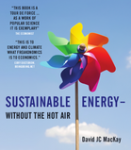 The premises are simple. First, energy consumption must be met by energy production. Second, use of fossil fuels is unsustainable. Third, no magical technological fix to the energy problem is going to arrive. Finally, to understand a sustainable future, we must think quantitatively. That is, to proceed with a debate about, for example, wind or solar without a firm understanding of the magnitudes involved is foolishness. This last premise is where Sustainable Energy departs significantly from the vast majority of information available in the popular press, which trumpets dubious oversimplifications like “hydrogen is good” or “unplug your phone charger when not being used” without providing the larger context.
The premises are simple. First, energy consumption must be met by energy production. Second, use of fossil fuels is unsustainable. Third, no magical technological fix to the energy problem is going to arrive. Finally, to understand a sustainable future, we must think quantitatively. That is, to proceed with a debate about, for example, wind or solar without a firm understanding of the magnitudes involved is foolishness. This last premise is where Sustainable Energy departs significantly from the vast majority of information available in the popular press, which trumpets dubious oversimplifications like “hydrogen is good” or “unplug your phone charger when not being used” without providing the larger context.
The central question this book deals with is: If we must stop using fossil fuels, can we keep expending the amount of energy that we currently do, or will our standard of living necessarily contract? To attack this question, the first part of the book alternately describes the components of energy demand and potential alternative sources such as tides, wind, and solar. Impressively, MacKay manages to create a certain amount of tension between the supply and demand sides of the equation, making this initial part of the book more entertaining than it perhaps sounds.
The second part investigates sustainable energy in more detail. How much can we save by mass transit? Electric cars? Better insulation? On the production side, what can we do with nuclear power? With solar energy from Africa’s vast deserts? The capstone of Sustainable Energy is a collection of five energy plans for Britain, each making different tradeoffs between nuclear or not, domestic power vs. imported, etc. The message is clear: we can live without fossil fuels, but only at considerable expense and inconvenience.
MacKay’s presentation of the material is clever. He writes in an engaging way, including plenty of personal opinions and anecdotes. The graphs and figures are first-rate. Person-sized units of power such as kWh per day help us understand energy at a level where we can each make a difference, as opposed to the more remote view promoted by nation-sized units like GWh per day. Facts are backed up by simple, intuitive physical explanations that will appeal strongly to scientific-minded readers. Finally, MacKay includes a lot of specific recommendations for ways that individuals can make a difference in their own energy consumption, often supported by data and stories from his own life.
One could easily quibble with some of the specific quantities used in the book, such as the average wind speed in Scotland or the amount of unmined uranium in Africa. However, to do this is to miss the point. MacKay isn’t so much providing a collection of facts as a framework for thinking about energy supply and demand. It is a certainty that over the next few years estimates of energy reserves will be refined and technologies like solar panels and batteries will improve a bit faster or slower than expected. This new information may alter the nuances of MacKay’s message, but the fundamentals are so large that no invention short of practical fusion will render the book obsolete. Similarly, an American reader could become irritated with the UK-centric nature of the writing, but again this misses the point: from the American point of view the major difference is that in the UK they use far less energy per person than we do. Also, towards the end of the book MacKay specifically addresses the question of adapting his energy plans for the USA.
In summary, entering the energy debate without reading this book is like debating Christian theology without having read the Bible. MacKay has created a work that is enjoyable to read and also provides a framework for understanding and discussing one of the most important problems faced by the developed world in the next 50 years. An electronic copy of the entire book can be downloaded for free.
One response to “Book Review: Sustainable Energy — Without the Hot Air”
I just missed a chance to see this guy talk at Northeastern a couple years ago.
I heard it was a great presentation.